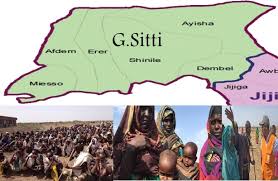In conflict resolution, mediators play a crucial role in helping to settle differences between opposing parties. However, when the situation is as complex and volatile as the one between the Afars and Issas in Ethiopia, the task of mediation becomes extremely challenging. The Afar and Issa tribes have a long history of tension and violence, with grievances that date back many years. The current situation is compounded by the fact that the victims of this conflict are left without homes or support, while the government and its security forces appear to be taking sides and allowing crimes to go unpunished.
The first step towards achieving peace in this situation is to ensure that all parties involved are willing to engage in dialogue and negotiations. Mediators must work to create a safe and neutral space where both the Afar and Issa communities can come together to discuss their grievances and work towards finding a resolution. This will require building trust and confidence, as well as addressing the underlying issues that have led to the conflict in the first place.
One of the key challenges in mediating between the Afars and Issas is the lack of support and protection for the victims of the conflict. Many people have been chased from their homes, killed or displaced, and are now living in desperate conditions. Mediators must work to ensure that the needs of these vulnerable populations are addressed and that they are provided with the necessary support and assistance to rebuild their lives.
Another major obstacle to peace is the apparent bias of the government and its security forces. It is essential that mediators address this issue head-on and work to ensure that all parties involved are treated fairly and impartially. The rule of law must be upheld, and those responsible for crimes and violence must be held accountable, regardless of their tribal affiliation.
Furthermore, efforts must be made to reconcile the warring factions and foster a sense of unity and solidarity among the Afar and Issa communities. This will require a commitment to dialogue, reconciliation, and forgiveness, as well as a willingness to move beyond the past grievances and work towards a shared future.
The failure of the Islamic council’s efforts to mediate the conflict highlights the challenges and complexities of the situation. It is clear that a more robust and inclusive approach is needed, one that involves a wide range of stakeholders and ensures that the voices of all communities are heard and respected.
In conclusion, achieving peace between the Afars and Issas in Ethiopia will require a concerted and sustained effort on the part of all parties involved. Mediators must work tirelessly to build trust and confidence, address the needs of the victims, ensure the impartiality of the government and its security forces, and foster reconciliation and unity among the warring factions. It will not be an easy task, but with determination, perseverance, and a commitment to justice and peace, it is possible to bring an end to this long-standing conflict and build a brighter future for all of Ethiopian citizens.





